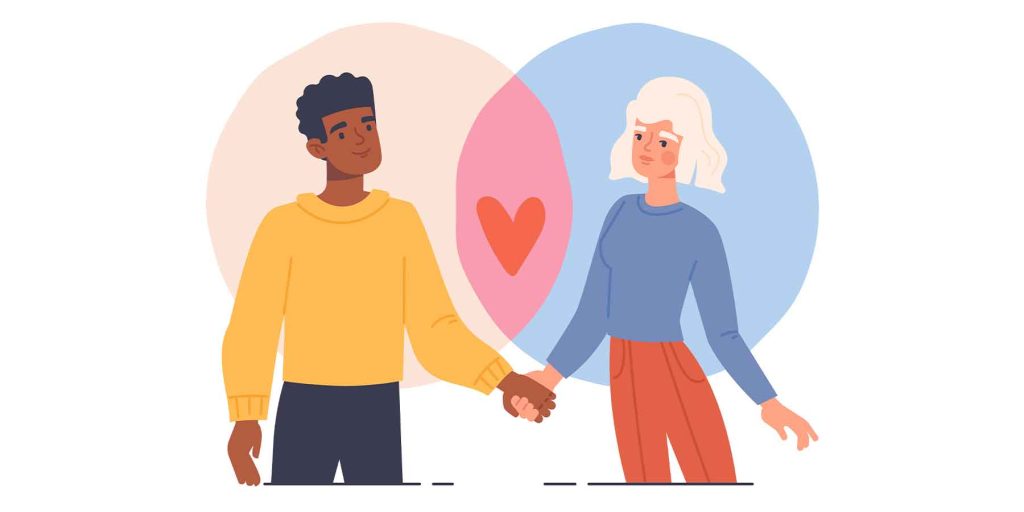What Are Boundaries?
Boundaries are what separates one thing from another. Borders of states, property lines, and even the edge of whatever screen you’re viewing this blog on are all examples of boundaries. In
relationships, boundaries are how we maintain our autonomy and independence while still developing bonds with another person. In this blog, you can learn more about what boundaries are, how to set them, and the benefits of working with a therapist to develop healthy boundaries in all of your relationships.
In relationships, the boundaries we set are what helps us develop a definition to let other people know what we’re comfortable with. Boundaries tell other people what we need to feel safe, be happy, function every day, and be the happiest and healthiest versions of ourselves. When we talk about setting boundaries, we’re often talking about romantic relationships, but boundaries are important in all of our relationships. Do you feel uncomfortable or dread going to family events? In many cases, these feelings stem from having poor boundaries within your
family. Setting better boundaries with family members can help you feel safer and find more enjoyment when interacting with your family. Friendships often need better boundaries as well.
Do you have a friend or friends who always seem to be showing up at your house uninvited? Setting a boundary that they need to call or text first can help you protect your privacy and personal space. Boundaries also protect your friendships. Over time, you are likely to become frustrated or resentful of friends who always invade your personal space. These are just a few examples of how boundaries are beneficial in all aspects of your life. There are many different reasons to set boundaries. It’s a good rule of thumb that if you’re feeling frustrated, uncomfortable, angry, or otherwise unhappy in a relationship you may need to set a boundary.
How Do You Set Good Relationship Boundaries?
Setting boundaries is important, but it’s not always easy. It takes a gentle but firm stance to set a good boundary to protect yourself while also protecting your relationships. We recommend the following steps to set and maintain good boundaries with your loved ones:
Listen – we put this first because listening to your loved ones is just as important as setting your own boundaries. Listen with empathy. Try to see your loved one’s perspective as you discuss your own needs. If you model empathy and compromise, your loved one is more likely to respond in kind.
Be honest but kind – state what you need simply and clearly. Be straightforward, but as kind and respectful as possible as you talk with your loved one, especially if they may be upset or hurt by what you have to say.
Be consistent – once you set a boundary, you have to reinforce it. It’s likely going to take your loved ones more than one reminder to learn a new boundary you set. Stay consistent.
Reset broken boundaries – if a boundary is repeatedly broken, take time to talk to the person who is crossing the boundary and reset it. Perhaps, you can adjust the boundary as a compromise. As long as you feel comfortable, compromise is okay. If you won’t feel comfortable with the compromise, confirm and rest your boundary.
Know when to leave – if there are people in your life who consistently cross your boundaries, it may be time to make a decision to spend less time with these people.
Can Therapy Help?
Setting boundaries may sound simple, but it can actually be difficult, especially when you are just starting to set boundaries with your loved ones. One of the best ways therapy helps you
learn to create boundaries is by modeling boundary-setting behavior. When you work with a therapist, they will set boundaries for your time in therapy, and they will ask you to set
boundaries as well. They will ask you to let them know what you’re comfortable with and respect boundaries that you set. In addition to modeling boundary-setting behaviors, your therapist can help you plan and practice setting boundaries in other relationships. They will also be there to support you if setting boundaries is difficult, your loved ones are crossing boundaries, or you experience any other challenges as you continue to set boundaries
Ready to get Started?
If you want to learn more about therapy to help you set boundaries, improve communication, and generally have better relationships, we hope you’ll reach out to the team at Lotus
Psychology Group. To get started you can call our practice at (248)957-8973, email our admin team at info@lotuspsychgroup.com, or complete our online scheduling form. We look forward to seeing you soon.

